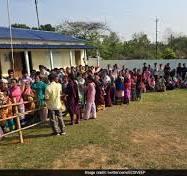
Since the days of Aristotle, democracy has been the ideal of political philosophers. Since the French Revolution, government of the people, for the people and by the people through their chosen representatives has been the ideal form of government for all nations. Democracy, according to George Bernard Shaw, is “a social order aiming at the greatest available welfare for the population and not for a class.”
The origin of democracy may be traced to remote period of human hi9story. The vedic King in ancient India was controlled by Saabha and Samiti. Moreover, the village republics of the ancient India were in essence democratic. There was a system of electing an executive responsible to Panchayat and liable to be recalled at any time. In the age of Pericles, government was run by popular assemblies. In the time of Plato and Aristotle, the direct democracy of Greece had won a glory. Thus, democratic idea is not a new idea, but it has assimilated a tremendous political sanction in the modern time.
Democracy can be direct as well as indirect. Direct democracy implies that every citizen has a say in the affairs of his country. In ancient Greece, this form of government prevailed to a great extent. In those days there were city States. All the people could assemble in a place and could debate the issues at leisure and then decide them through a show of hands. The casting of votes thus presented no problem. Things have undergone a radical change. In the modern times, the States have grown in size, becoming so vast that direct democracy is to take the recourse to indirect democracy, that is Government by means of elected representatives and not through direct methods.
The chief merit of democracy is that it is based upon the principles of consent and equality. Will, not force, is the basis of State. Government subsists on the cooperation and consent of the governed, all of whom are equal. Democracy thus rejects the aristocratic cannon: “Some are born to rule and others to obey.” It grants no special privilege to an individual and upholds the dignity of the common man. Distinctions of caste, creed, colour or sex do not deprive anyone of his “natural right.”
Another important aspect of democracy is that it flourishes on the food of debate and discussion. It upholds the principle of liberty. The democratic slogan is “liberty, equality and fraternity”. Freedom from of thought, expression and association are thus basic postulates of democracy. People can freely criticize the government and use all peaceful and legitimate means to change it, if it does not reflect their wishes.
On the other hand, if we compare democracy with dictatorship, its greatest rival we find that democracy is better form of Government. Dictatorships are modern version of monarchy. Difference of opinion, freedom of speech and even the development of individual freedom are the things that are greatly hampered in a dictatorship. There is a regimentation of society and the dictator is all in all. The dictator subordinates the individual to the State and the State is his own will.
Both democracy and dictatorship may degenerate. But it is easier for the latter to develop into autocracy, than for the former to degenerate into mob rule. Besides, the aggressive nationalism, which dictator glorifies, is a challenge to internationalism, and a menace to the world peace.
The challenge of communism to democracy is a spiritual challenge. It is new Christian heresy and like all other heresies, it has power to move the hearts of people by holding out to them a great promise of better life in brief period. As a form of government, it is equally impressive. Russia could convert a backward feudal country within forty years, a front rank world power. But finally, Russia collapsed. And, with that the new concept also ended implying that this form of rule is not sustainable.
Orthodox democracy has proved itself miserably unequal to the requirements of a modern State. The problem is to modify the traditional institutions of democracy to suit present day conditions. The inefficiency of democracy first became noticeable in its economic aspect. One of the most important problems for democracies, therefore, is to manage their economic system in such a way, as to ensure for everybody a reasonable high standard of living coupled with a reasonable amount of security and liberty.
